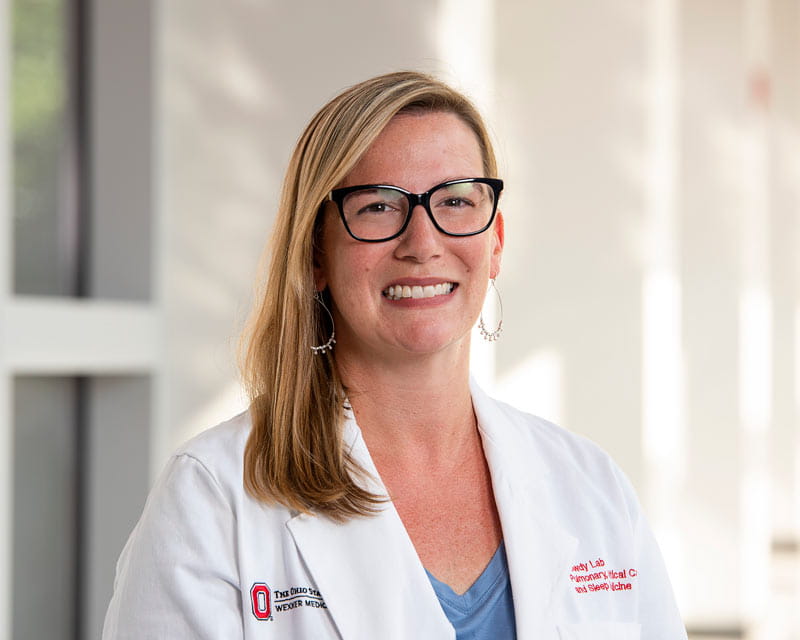
Ohio State Researchers Launch NIH-Funded Study on Ozone-Induced Pulmonary Inflammation
 Over multiple years, a committee of multidisciplinary experts in interstitial lung disease (ILD) from the American Thoracic Society (ATS) joined specialists from the European Respiratory Society, the Japanese Respiratory Society and the Asociación Latinoamericana de Tórax to update prior guidelines for idiopathic pulmonary fibrosis (IPF) and establish new guidelines for progressive pulmonary fibrosis (PPF) in patients with ILDs other than IPF. This influential group included Derrick Herman, MD, a pulmonologist at The Ohio State University Wexner Medical Center. The international committee of ILD clinicians, ILD radiologists and pathologists, methodologists and patient representatives completed systemic reviews and meta-analyses using the Grading of Recommendations Assessment, Development and Evaluation (GRADE) approach as part of the guideline development process to inform the committee’s recommendations for practice.
Over multiple years, a committee of multidisciplinary experts in interstitial lung disease (ILD) from the American Thoracic Society (ATS) joined specialists from the European Respiratory Society, the Japanese Respiratory Society and the Asociación Latinoamericana de Tórax to update prior guidelines for idiopathic pulmonary fibrosis (IPF) and establish new guidelines for progressive pulmonary fibrosis (PPF) in patients with ILDs other than IPF. This influential group included Derrick Herman, MD, a pulmonologist at The Ohio State University Wexner Medical Center. The international committee of ILD clinicians, ILD radiologists and pathologists, methodologists and patient representatives completed systemic reviews and meta-analyses using the Grading of Recommendations Assessment, Development and Evaluation (GRADE) approach as part of the guideline development process to inform the committee’s recommendations for practice.
Among the IPF revisions to recommendations for clinical practice are up-to-date radiological and histopathological criteria, as well as evidence-based recommendations for transbronchial lung cryobiopsy, genomic classifier testing, antacid medication and anti-reflux surgery.
“We issued a conditional recommendation to regard transbronchial lung cryobiopsy as an acceptable alternative to surgical lung biopsy in centers with appropriate expertise,” Dr. Herman says, “but no recommendation was made for or against genomic classifier testing. In addition, conditional recommendations were made against antacid medication and anti-reflux surgery for the treatment of IPF.
“With regard to progressive pulmonary fibrosis, we formally defined this as a specific phenotype of ILD behavior and established its radiological and physiological criteria. To confirm a PPF diagnosis, a patient should have at least two of the three criteria within the past year with no alternative explanation — worsening symptoms, radiological progression and physiological progression.”
The committee also issued a conditional recommendation for nintedanib and called for additional research on the efficacy of pirfenidone as a PPF treatment.
“Clinicians should still be making their own informed decisions for each patient,” Dr. Herman says. “Our conditional recommendation should only add to their awareness and provide treatment options.”
Dr. Herman has a unique background that makes him an especially appropriate choice for ILD guideline committee membership. In addition to his clinical expertise in ILD, he’s developed an interest in evidence-based medicine and critical appraisal. He holds a master's degree in Medical Sciences, with a concentration in research methodology, and he’s completing an apprenticeship in research methodology with the ATS.
“Early in my career I was already working with world leaders in these diseases, and that continues with this guideline committee where I’m able to leverage my clinical experience, interest in evidence-based medicine and methodology skills in one role,” he says. “It’s been a real honor and an advantage for my own ILD knowledge.” In addition to this ILD guideline, Dr. Herman’s work with international experts continues on another ATS clinical practice guideline that’s still in process.
“Dr. Herman’s participation on these guideline committees gives Ohio State a voice in making clinical recommendations across the world,” says Jeffrey Horowitz, MD, ATSF, FCCP, director of both the Division of Pulmonology, Critical Care and Sleep Medicine and Ohio State’s comprehensive interstitial lung disease clinical and research programs.
The ILD program at Ohio State provides a fertile environment for professional development and new learning for Dr. Herman. He’s part of a multidisciplinary team that provides a robust range of treatment options, clinical research opportunities and support services. Included on the team are specialists from pulmonology, rheumatology, cardiology, gastroenterology, thoracic pathology, interventional radiology, thoracic surgery, pulmonary rehabilitation, transplant pulmonology and palliative care.
“Our program is one of the most comprehensive you’ll find,” says Dr. Herman, noting the scope of care that extends to transplant pulmonology as an example. “We’re able to adjust and expand treatment regardless of disease stage,” he says. “One particular strength of our program is our multidisciplinary ILD conference, attended regularly by pulmonologists, radiologists and pathologists, where we discuss challenging ILD cases and formulate individualized treatment plans for patients.
“We want to make care as convenient as possible too. That’s why we have multiple clinical locations across Columbus, each with on-site pulmonary function testing and CT capabilities so that patients can get their testing and see the experts they need all in a single day. That can make a real difference to people fighting a chronic, progressive disease, and it’s especially helpful for those who travel hours to receive their care from us.”
Dr. Herman also highlights Ohio State’s extensive research program and patient and family support groups, which provide interactive meetings covering a broad range of topics to help educate and assist patients.
“We want to attack ILD from all sides,” he says. “That means helping today’s patients understand their disease and cope with their treatment, while also offering research opportunities for access to promising and emerging therapies or to help us further develop our understanding of the underlying mechanisms that drive ILD.”
Ohio State’s ILD program can offer referred patients the full breadth of treatment options or facilitate their participation in clinical trials and patient support groups. We also welcome requests for second opinions or physician consultations, where patient cases are discussed in the ILD conference with recommendations passed back to the patient’s primary pulmonologist.
To learn more or refer a patient to Ohio State’s Division of Pulmonology, Critical Care and Sleep Medicine, physicians or other care providers can call 614-293-4935 or fax a referral form to 614-293-1456. If urgent, call 614-293-5123 after faxing to expedite order entry.
To see a list of pulmonary studies that are actively recruiting participants, visit Ohio State’s Study Search.
Learn more about innovations in care and research from the Division of Pulmonary, Critical Care and Sleep Medicine.